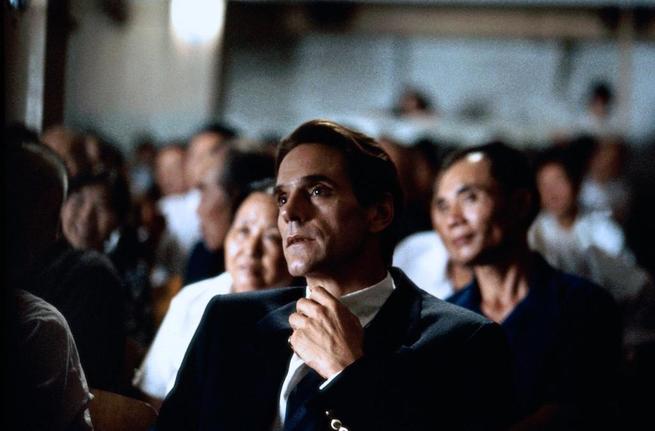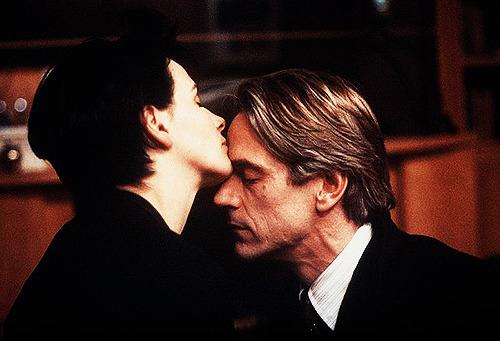Dead Ringers
 Thursday, January 22, 2015 at 11:46
Thursday, January 22, 2015 at 11:46 The original source of this film has been claimed and disputed, sometimes unpleasantly, although the curious researcher can cite a novel, another film released only a few years before it (that treats of a very different situation), as well as the case of real-life twin gynecologists. I have always found the Greenaway claim as spurious as the garbage it perpetrates; I know nothing of the book (actually mentioned as the film's basis) or of the now long-deceased brothers. Whatever the inspiration, it is the final product that justifies its ingredients, and that product is nothing less than exquisite.
 Our twins are first seen in 1954 in what, owing to their British speech, we imagine may not be their native Ontario. Nerdiness, light-brown hair, glasses, and a peculiar fastidiousness in manner distinguish the twins from the rest of humanity, but not in any way from one another. They approach and proposition a coeval, perhaps around eleven, and she responds with the two missiles children always launch at one another: threats from a parent and the very plausible assertion that the twins do not know the slightest thing about copulation. As it were, our lads are precocious enough to end up thirteen years later at Harvard Medical School; they are also perverted enough – perverted might not be the ideal choice of words – to provoke suspicion among their supervisors for their unusual methods and tools. After this brief introduction we come to the present time and place, 1988 Toronto. The two men, identified in a school awards ceremony, are Elliot and Beverly Mantle (Jeremy Irons in bilocation) who have grown into identical copies of one another in profession and appearance. Gynecologists with their own clinic, their bizarre, almost sadistic devices now standard issue in the industry, the brothers' success is reflected by their enormous modern flat, a favorite expensive restaurant where they are served as if they never leave, and a certain insouciance towards the cares of lesser beings. In time, two important facts are revealed: Elliot, or Elly, is the gregarious, schmoozing sort who handles all public relations matters, finances, and teaching; Beverly, or Bev, is the researcher and normally the fellow in the office examining patients. One suspects that their female-sounding hypocorisms (no one else addresses them as such) may be akin to odd nicknames used in turn-of-the-century British literature, but I digress. Now and then when one of them is tired, unwell, or otherwise indisposed, the other fills his shoes and no one notices anything awry. Even if the fabulous Mantle brothers are known in Toronto for many things, one of which is women.
Our twins are first seen in 1954 in what, owing to their British speech, we imagine may not be their native Ontario. Nerdiness, light-brown hair, glasses, and a peculiar fastidiousness in manner distinguish the twins from the rest of humanity, but not in any way from one another. They approach and proposition a coeval, perhaps around eleven, and she responds with the two missiles children always launch at one another: threats from a parent and the very plausible assertion that the twins do not know the slightest thing about copulation. As it were, our lads are precocious enough to end up thirteen years later at Harvard Medical School; they are also perverted enough – perverted might not be the ideal choice of words – to provoke suspicion among their supervisors for their unusual methods and tools. After this brief introduction we come to the present time and place, 1988 Toronto. The two men, identified in a school awards ceremony, are Elliot and Beverly Mantle (Jeremy Irons in bilocation) who have grown into identical copies of one another in profession and appearance. Gynecologists with their own clinic, their bizarre, almost sadistic devices now standard issue in the industry, the brothers' success is reflected by their enormous modern flat, a favorite expensive restaurant where they are served as if they never leave, and a certain insouciance towards the cares of lesser beings. In time, two important facts are revealed: Elliot, or Elly, is the gregarious, schmoozing sort who handles all public relations matters, finances, and teaching; Beverly, or Bev, is the researcher and normally the fellow in the office examining patients. One suspects that their female-sounding hypocorisms (no one else addresses them as such) may be akin to odd nicknames used in turn-of-the-century British literature, but I digress. Now and then when one of them is tired, unwell, or otherwise indisposed, the other fills his shoes and no one notices anything awry. Even if the fabulous Mantle brothers are known in Toronto for many things, one of which is women.
The Mantles' pursuit and conquest of women, often their own patients, becomes the barometer for the sole distinction between the brothers: that of temperament. Elly is the smarmy bastard who enjoys serial love affairs without incurring anything more than an occasional slap in the face; Bev is the quiet, retiring academic trapped in a state of perpetual discomfort. While Bev's research generates the lifeblood of Elly's operations (as well as his eventual professorship), Elly's Lothario schemes get Bev laid. "If it weren't for me," says Elly in a moment of amazed recognition, "you'd still be a virgin." It is therefore of no particular importance that Elly has most recently gotten himself involved with a well-known actress by the name of Claire Niveau (Geneviève Bujold). Claire has always wanted children; as Elly so succinctly puts it, she typifies that typical headline, "Celebrity actress says life incomplete without children." Of course, she has solicited the aid of Dr. Mantle, whom she, unlike most of Toronto, knows as one person, implying that circumstances have gotten rather dire. Upon examining her Elly learns the cause: she has a trifurcate cervix, a freak mutation that is "fabulously rare." Googling such a term yields entries almost exclusively referring to Dead Ringers, which might indicate that we are dealing with medical fantasy. Whatever the case, the notion of mutation will plague the brothers for the entire film – they will find neither a way over nor around it. Elly does what he wants to do with her then, at the next opportunity of casual gratification, gleefully recommends that Bev replace him. He does and arrives at Claire's as shyly as Elly seized her hips and reminded her that every fiber of her body can be linked in palpitating bliss. One detail suggests that Claire perceives the difference from her very first embrace with Bev, but will be officially informed at a lunch with a friend later on. Her first scene with Bev remains, however, paramount to the developments that will occur, and includes one of the greatest lines in the history of cinema ("I've never used contraceptive devices; I've never even thought contraceptive thoughts"). But over time she notices that there exist two distinct personalities, the sweet caring one and the human excrement – which is how she addresses the brothers when she finally meets them together.
What occurs thereafter has garnered the Dead Ringers praise as a horror film, perhaps because the opening credits emit something of the macabre. Some reviewers have even sided with Claire – for reasons, I admit, I could not possibly imagine: she is not compelling, interesting, or even comely. Past her prime and obsessed with the child she cannot bear, she annoys us as much as she annoys Elly and Bev. Well, actually, that's not quite right. Bev takes to her more passionately than he's likely taken to anything or anyone in his life apart from medicine; Elly, on the other hand, grows jealous of her command over his brother. At the film's midway point Claire summons the elder twin to her makeup trailer to talk about Bev and, in a very starlet-like gesture, to discover whether Elliot, too, can't be convinced to love her. We initially see one side of her face, which is untouched by rouge or powder and rather masculine in its ferocity – but she turns to Elliot and we see what violent embellishments her role calls for, the career-resurrecting role, mind you, for which she abandons Bev to his own devices for ten long weeks. Therefrom we proceed down a swerving, troubled path, but we do realize why women are allowed to come between these two men only when they are patients or prey (Bev is "no good with the frivolous ones," Elly "no good with the serious ones"). So the dénouement should not surprise anyone except the lovers of melodrama – which would be, in a way, the vast majority of those frivolous or serious women. And you may do well to remember that old adage about the gun on the wall.





